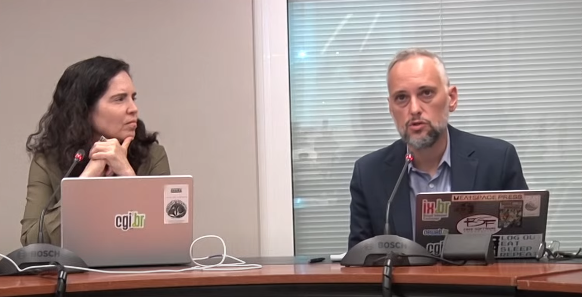The debate over how digital platforms such as Google and Facebook can pay for journalistic content in Brazil has just gained important support, with the publication on Wednesday (May 17) of the report "Remuneration of journalism by digital platforms" by the Brazilian Internet Steering Committee (CGI.br, by its Portuguese acronym), the cross-industry entity responsible for coordinating initiatives related to the use and operation of the Internet in Brazil.
The study, written at the request of the committee's Chamber of Content and Cultural Assets, aims to map out the debate inside and outside Brazil on the remuneration of journalism by digital platforms. The research systematizes what the main sticking points were until March 2023 for the establishment of a regulatory framework in the country, with summaries of the positions of each actor in the discussion and what their main actions have been.
The timing of the study's publication is urgent — heated disputes surround the regulation of digital platforms in Brazil, which has been on the agenda for more than three years. The proposed legislation, popularized under the name PL das Fake News [Fake News bill], had its vote in the House Plenary delayed two weeks ago and today it is uncertain if the vote will happen.
Among the themes of the comprehensive bill, whose topics range from punishing big techs for content such as incitement to coups to the transparency of content recommendation algorithms, the remuneration of digital platforms to journalism is an especially contentious issue.
Amidst various controversies, platforms claim that the law may force them to pay disinformation agents who present themselves with a journalistic veneer. There is also disagreement between smaller and larger news outlets about how the distribution of funds should be handled.

The author of the study, Marisa von Bülow
The main options on the table are the bargaining mechanism, i.e., direct negotiations between digital platforms and news companies, or a participatory governance industry fund to finance journalism. At the launch of the report, a hybrid between the two was also considered.
As journalist Guilherme Amado first reported on May 5, party leaders have reached an agreement to remove the provision on journalism pay from the package. The remuneration for journalistic content may end up being voted on separately this very week, alongside a bill that concerns artists' copyright.
Besides addressing the debate in Brazil, the report, which was written and researched by political scientist Marisa von Bülow and edited by anthropologist Rafael Evangelista, also discusses the main equivalent regulatory frameworks in the world, as is the case of laws in Australia and the European Union.
The study several times emphasizes that attention needs to be paid to local specificities. "Until 2022, the debate has focused mainly on developed countries," the text says.
"Bringing this debate to developing countries, such as Brazil, implies reflecting on the specific challenges to be addressed. In a context of greater digital inequalities — both in access and quality of access — than in developed countries, the journalism crisis in Brazil has impacts that are felt disproportionately by the population living in the periphery or more isolated places," it adds.
The basis for the research consisted of a comparative analysis of legal initiatives inside and outside Brazil, a review of the literature on the topic, and interviews with key actors, such as researchers, activists, legislative consultants, and representatives of digital platforms.
The notion that digital platforms should pay for journalism comes from the understanding that, to a large extent, the crisis that journalism is going through today is a consequence of a new situation for digital advertising and new forms of consumption, production and distribution of journalistic content.
"The summary of the argument in favor of new regulatory frameworks that force digital platforms to negotiate with news companies is: News producers are increasingly dependent on platforms to reach their audiences and raise advertising resources, but are not adequately compensated for the use that these platforms make of their content and cannot negotiate in a balanced way without the intervention of the state," according to the report.
Five points are identified as particular sources of friction dividing the actors in the debate. The first of these concerns "who should benefit," that is, what should be the minimum criteria for designating the actors to be paid.
So far, legislative proposals in Brazil and abroad have sought to establish minimum criteria for designating potential beneficiaries, such as the number of employees or turnover, or the length of time the news outlet has been in operation, as well ass the need to adhere to a code of ethics.
All criteria are subject to criticism: Small businesses, individuals or new entrants to the market may end up not being considered. On the other hand, the absence of a filter to designate who is a professional may end up allowing agents of misinformation to have access to resources.
An alternative, as argued in separate proposals by the National Federation of Journalists (Fenaj) and the Association of Digital Journalism (Ajor), is the creation of a public fund, which would allow the financing of specific actors (such as journalism serving underrepresented communities or news deserts), and would also allow the financing of projects beneficial to the sustainability of journalism as a whole.
The second controversy is over who should be responsible for paying. There is no international consensus on the vocabulary used to determine the actors that pay: While Australia refers in its law to "digital platforms," the European Union uses the term "online content sharing service providers," and Canada, where the bill is still in process, speaks of "digital news intermediary companies." In Brazil, the Fake News Bill used the expression "providers of social media, search engines, and instant messaging services.”
More important than the designation are the criteria of who will be responsible for paying. This determines, for example, whether only Google and Facebook will remunerate journalistic content, or whether the bill should also include other organizations, from Twitter, to LinkedIn and Twitch.
The third controversy concerns what constitutes journalism and public interest journalism. This issue is important because much of what the media publish that attracts the most audience is entertainment-related, such as celebrity news, sports news, or brief news stories of all kinds. Criteria such as clicks can serve to diminish the quality of journalism.
This point also relates to the possible negotiation of voluntary agreements between platforms and journalism companies. Australia has adopted this model with confidential agreements. This generates criticism that it is not possible to evaluate the impacts of the law due to a lack of transparency.
According to the report, in this case, the idea of a fund may be a solution to the problem, by opening “other remuneration possibilities, such as financing technological innovation initiatives, and the use of criteria other than the amount of content produced or the audience.”
The fourth controversy concerns the need to give more transparency to the platforms' actions, in items such as, for example, their advertising revenues and their algorithms to boost certain content to the detriment of others.
According to the platforms, this point is sensitive because much of this data is protected by trade secrets and cannot be made public. However, according to the report, “numbers that cannot be corroborated by an independent audit or regulatory body make the decision-making process on the subject of journalism remuneration very difficult.”
Finally, the fifth controversy is about what should be the role of the state in the negotiations between digital platforms and journalistic content producers. The main proposal for Brazil has been, as in the Australian case, that of bargaining: The actors negotiate among themselves, and, if necessary, the state plays the role of arbitrator. This is the position defended by the main media organizations, such as the Globo and Folha groups.
According to CGI.br, "there is, however, no consensus on whether this is the best model, considering, also, the specificities of the Brazilian context, in which the free negotiation between the parties may result in an even greater concentration of resources and power in a small number of actors.”
Once again, the idea of a public sector fund managed in a participative way emerges as an alternative, in which the State would play a more proactive role.
The debate in Brazil about the remuneration of journalism is happening at a fast pace, with developments practically every day.
This means that the study, having closed its data collection in March 2023, did not contemplate, for example, that the remuneration to journalism happen from a logic of artistic productions’ copyright, as is the proposal that has gained more force in recent weeks. Congressmen say that the vote on the bill could happen at any moment, but it is uncertain when it will actually happen.
At the report's launch event, author von Bülow said that the team considered postponing the publication, but preferred to launch it soon in order to be able to contribute to the debate.
"We thought about postponing, because every day there was news, but to keep the timing, we released it sooner rather than later. Maybe we can update it in a few months, but we launched it soon to try to influence and improve the debate," the researcher said.

The author of the study, political scientist Marisa von Bülow, alongside the editorial coordinator of the initiative, anthropologist Rafael Evangelista
Questioned about which model would be the best for Brazil, von Bülow was in favor of a hybrid model that united the bargaining mechanism and the government fund.
"A fund may be a bad solution. The answer may lie in something hybrid. [The policy] can be thought of from two different objectives," she said. "You would have the bargain, following Canadian logic, taking into consideration the issue of plurality of news. But at the same time, a fund that allows us to think about the sector and have a promotion policy. In an ideal world, it would be a hybrid model. But this dialogue has yet to mature. I don't know of any case of a hybrid model," she said.
Next to her, the editorial coordinator Evangelista added that "he doesn't see any problem with Brazil being a pioneer."
Despite its attention to a specific national context, the report can also help people in other countries think about how digital platforms can pay for journalism in their own countries. As the author say in the first chapter, new bills have been introduced in different countries that look to each other for examples and ideas.
"The challenges are global, and Brazil is one of their main showcases: What is decided in this country will have a huge impact on Latin America and other regions," the study states.